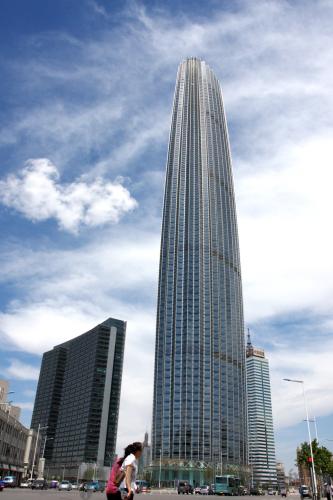|
 |
|
INTO THE SKY: Skyscrapers are mushrooming all over China. This is a newly-built tower in Tianjin Municipality alongside the Haihe River (XINHUA) |
Bridge Collapse
The Wuhan Yangtze River Bridge in central China's Hubei Province was hit by a huge oil tanker on June 6, the most serious accident until now for the 56-year-old bridge.
The bridge has been hit before dozens of times. One accident in July 1990 involved a crane ship weighing 900 tons. Despite the forceful strike, later investigations discovered no serious damage to the bridge. This time the bridge was hit by an even bigger ship, but it still has managed to remain stable.
Ironically, over the same river, the 11-year-old No.3 Yangtze River Bridge of Wuhan, which cost 1.1 billion yuan ($169.2 million), has undergone more than 20 repairs.
Throughout China, many newly-built bridges break easily, not to mention those "older" bridges that have already lasted for eight or 10 years. Statistics show, from 1999 to now, there have been more than 30 big bridge collapses in China.
When the Wuhan Yangtze River Bridge was constructed in 1955, it was found the cement being used was of poor quality. This cement was replaced with a high-quality substitute. Other technical deficiencies were remedied immediately after being discovered by inspectors. When material suppliers, builders and inspectors all hold such serious and devoted attitudes toward projects, there is no reason for a bridge to break down so easily.
In contrast, with more sufficient capital and advanced technology than 56 years ago, more modern bridges fall down very easily. Maybe it's time to recall the sense of responsibility in the time of the solid Wuhan Yangtze River Bridge.
Guangzhou Daily
Skyscraper Construction
The 2011 China Skyscraper City List issued by Shanghai-based Montiancity.com on June 6 shows China now has more than 200 skyscrapers under construction. This number equals the total of similar skyscrapers being built in the United States. In the next five years, China's total skyscrapers higher than 152 meters will reach 800.
Skyscrapers are usually regarded as a city's glory. In economics there is a concept of skyscraper index put forward by economist Andrew Lawrence, who discovered the construction of the world's highest buildings are linked to the sharp fluctuations of business cycles. His theory is this: Relaxed government policies and optimism about the future economy encourage large-scale engineering construction, but when excessive investments and speculation are about to damage the economy, stringent policies will be adopted to cope with any looming crisis, and thus the completion of tall buildings has been a sign of economic downturn.
The question is whether China will be able to usefully absorb these skyscrapers in the future. If they are used for real economy, these buildings can be fully absorbed; but if they are for other industries, such as the real estate industry, selling or renting will pose questions. On the other hand, the number of skyscrapers in a city is also related to other factors, such as the population and GDP of the city.
The general public might not be interested in how many skyscrapers their cities have, but they are interested in the improvement of their daily lives.
Workers' Daily
College Examination
The annual college entrance examination never fails to throw society into a kind of emergency state. Not only are the students and their parents trying their best to prepare for this important event, but also all governmental departments such as electric power, transport, public security and even environmental protection, are fully prepared to serve the examination.
As for the students, such massive movement will undoubtedly inflict psychological pressure on them and a small fraction of students might even turn to extreme means to cope with an examination accompanied by so much pressure.
Since it was resumed in the late 1970s, the college entrance examination has to the largest extent ensured the fair distribution of higher education resources and provided effective channels for ordinary people to move to the high end of society.
This examination is supposed to be one of the roads toward an ideal life, but not the only way. The present college entrance examination is still like a single-log bridge to a better life. If the education departments provide more channels to success, students may entertain a more relaxed attitude toward this competition. So will the rest of the society.
Qilu Evening News
High-Speed Train
The Ministry of Railways announced ticket prices for the Beijing-Shanghai High-Speed Railway, the world's fastest train, on June 13. The prices will range from 410 to 1,750 yuan ($63.1-269.2), much higher than that for ordinary trains.
While charging passengers high prices, the railway operator should ensure that passengers can enjoy high-quality services they pay for.
First, the operator should make sure that high-speed rail will be true to its name, and take every measure to avoid any delay caused by mechanical breakdown or inappropriate use of the train coach.
The Ministry of Railways should not discriminate against the poor. High prices will make high-speed rail use a privilege of the rich, but the true value of high-speed rails lies in the benefits it will provide to the average traveler while meeting the demand for faster transportation. The ministry said they will allow the prices to fluctuate with demand, which hopefully will take into consideration the ordinary passengers' affordability.
The railway operator should pay more attention to every detail of their services, making passengers feel as comfortable as possible when traveling. Passengers' expectations are sure to rise with these new and more expensive services. But already some high-speed rail stations have been criticized for lack of information on arrival and departure schedules or poor signage for exits and restrooms. On some high-speed trains, bottled water was not available and the coaches were not as clean as expected. Railway operators need to address these issues quickly.
Xinhua News Agency | 